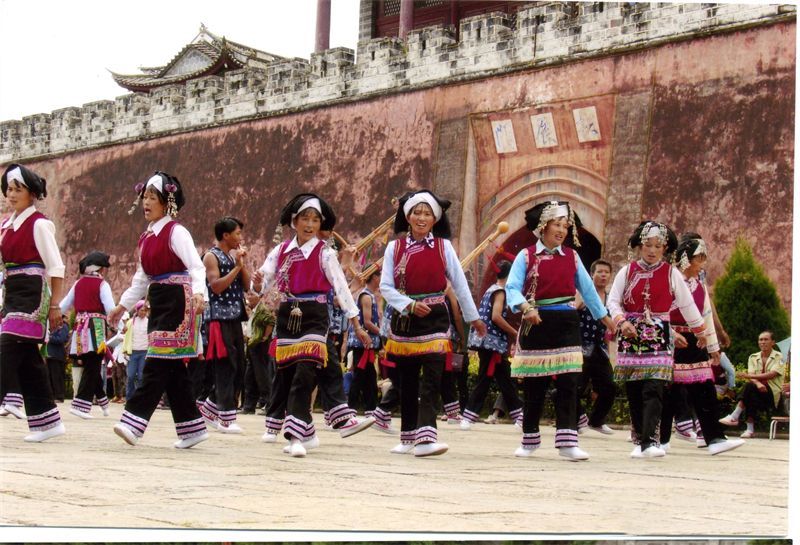The world in food culture: from "Gourmet" to "Yan Food Book"
Author:Literary vision Time:2022.08.15

Text/Meng Fanhua
In 1983, Lu Wenfu's "Gourmet" was published, which caused a great shock in the literary world. The novel surpasses the theme of politics and the times, and specializes in the excavation of food culture and shaped characters like Zhu Ziye. The novel was not important whether it was attributed to "reflection literature" or "rooting literature" and "cultural novels" at that time. What is important is that literature has a broader creative space, with a more free scope of materials, and further established writers and literature. The subjective position. From a capitalist who was "disgusted" to the process of being invited to the hotel to talk about the scriptures, he was finally elected as the president of the Culinary Society, expressing the huge changes in social life. The scenery of Suzhou's "eating culture" was a great view for a while, and the "marginal culture" that could not be on the "big scene" finally had the legitimacy and rationality of telling. Lu Wenfu also established a literary status because of this novel. The importance of "Gourmet" is that the novel shows a deep -rooted Chinese culture and civilization. This is the Chinese culture and civilization that sinks the daily life of the people. Probably since "Gourmet", novels related to daily life have begun to appear. This is the literary history of "Gourmet".
It is said that "Yan Food" is the finalist of the "Chinese Trilogy" series of "Chinese Trilogy" series of modern historical themes after Ge Liang "North Kite" and "Suzaku". The inheritance story of the food describes the scroll of social culture and worldwide feelings in the 20th century. From the perspective of the story, the novel has a distinctive world novel color, but it is not a traditional world novel. The owner of Xiaohua took the top three words in "The World of Fiction", "The World", "The Police World" and "Awakening" as an example. "Yan Food" is not exactly such a novel. The novel writes restaurant tea shops, Liyuan Temple, and red dust and pure land. Although it is a five elements and eight works, they also cover the early revolutionaries. In 1895, Sun Yat -sen and Yang Yunyun, He Qi, and "Dezhen West News" reporter Li De was drafted in the Guangzhou offensive strategy and foreign declaration in Xinghua Tower. At that time, He Qi, the richest man in Hong Kong, also spoke at the meeting to talk about how to establish a "interim government" policy outline after the uprising was successful. Later, the highest -level meeting of the revolutionary party was held in the private room of Xinghua Building to discuss the construction of new regimes. The first step determines the national body, and the second step is to select the temporary president of the new government. The meeting finally confirmed the establishment of the Republic government in Guangzhou, and unanimously recommended Sun Yat -sen as a temporary president. If this is the case, who dares to see this bustling restaurant tea shop? As a result, this "Yan Shi Ji" also has the "history tradition" spectrum, which is really not a high and expensive. There are many accidents in the revolution. Such examples are everywhere. Therefore, it is also appropriate to say that it is "orthodox".
In my opinion, the reason why "Yan Food" looks good is that in addition to its world novel "secularity", there are probably some characteristics: first of all, it is its knowledge. Both belong to local knowledge. We know that there are eight major cuisines in China: Lu, Sichuan, Guangdong, Su, Fujian, Zhejiang, Hunan, and emblem. Cantonese cuisine is characterized by fresh and fragrant. The selection of materials is fine, clear but not light, fresh and not vulgar, tender and not born, oil but not greasy. Good at small frying, requires the goodness of heat and oil temperature. It is also compatible with many Western cuisines, paying attention to the momentum and quality of vegetables. This is just an abstract summary. Its greater knowledge may still be in the back kitchen. So we saw the legend of the cooking legend of Gong Yisheng, the master of administrative chef Rong Rong in Tong Qinlou and his apprentice Wuju. The novel has a detailed writing of Cantonese dishes and cooking methods. It is difficult to tell the local knowledge that is difficult to practice. The magic of Cantonese cuisine is lively in the description of the wonderful brushwork. Of course, the major cuisine has such a legend, but through Ge Liang's telling, the production process of Cantonese cuisine itself has become a legend. On the other hand, the knowledge of Lingnan Tea House is even more diverse. For example, "巴 比", "teapot", "boiling water", "school tea", "opening tea", "hair water", "beating the teeth", "word flowers and dogs", "water pretty double rolling", "tea head", "things head", "head", " The fairy crosses the bridge "" two dragon drama beads "," snowflake cover "," five fingers fishing moon ", etc., identity, action, and" rules ". Foreigners are almost in the clouds in the clouds. The essentials of a bit of tea: "Finger nose is to have a 'fragrant film', which means that the fragrance is fragrant; refers to the mouth of the daffodils, and the water is promoted in the water; As for referring to the eyebrows, of course, it is to have a "Shoumei". "Wu Lao came to the" multi -male "tea house for less than one thousand words, and there were so many dialects. Dialects were a local variant of language. Sexual knowledge. This kind of local knowledge in "Yan Food" is everywhere. It was another expression of Lingnan's fireworks. Another example is "flower code", which is the "threshold" of "Enterprise Hall": "It is used on the teahouse tablet, also known as Fanzi. Tracing, it is evolved from the" calculation "of the Southern Song Dynasty. It began to spread in the middle of the Ming Dynasty. At that time, the economic and trade of the Suzhou -Hangzhou area was booming, and the businessmen gathered, and the flower code was used to count the transaction. The advantage of the flower code is that the writing is the same as the beads. Therefore, it is also called 'Suzhou Code'. Simplified and easy -to -use 'Suzhou Code' is more convenient than complicated Chinese characters. The price of the tea houses in Guangdong and Guangzhou will be used in generation. "
Secondly, Marxism believes that people must first eat, drink, live, wear, and then engage in politics, science, art, religion, etc. For the material life, eating is the first place, and "people take food as the sky" is an absolute hardship. More importantly, like the residence and clothing, the choice, preferences, habits, and the person's identity, status, gender, etc. are closely linked to the diet, so diet is a politics, especially a kind of identity politics. The "Yan Food" in "Yan Food" is the daily lunch and dinner of "doctors, scholars, and people." The custom of eating is the same as dialect, which is also a local mark, or even a local civilization. A person can change many habits, only the memory of taste buds is difficult to change. In turn, taste buds have also become an important mark of ethnic identity. Master Rong Yisheng is a "big press", and his "hand lotus" no one can enemy. At that time, the old disciple of Han Shijiang, the old "Yueyuelou", went to Hong Kong to "Tongqin Tower". As long as the diners eat the lotus bag, the master knows that Master Rong is not there. Later, some people gave the lotus crispy to Master Rong to the official chairman of the Hong Kong Food Federation. He tasted it and "shocked heaven." Not only did Master Rong start in Hong Kong, but also the "Lotus Rongbao Worship" also expressed the tip of the iceberg of Lingnan's diet politics. It can also be seen from the "core value" of "snacks" in Lingnan's food culture and the status of snack masters. Third, there are obviously many remarkable advantages in "Yan Food". The novel eventually writes the hearts of the world, shaping typical characters. "Yan Shi Ji" wrote many characters, but the most impressive is Master Rong Yisheng and his apprentice Chen Wuqu. The novel is based on the era of Guangdong and Hong Kong as the background, and the legendary life of Master Rong as the basic context, shaping the image of a "big master" like Lingnan food. He is dedicated and devout, whether he fights lotus or apprentices, he is meticulous; he obeys the rules and says nine -ding; Chen Wuyi was the only disciple of Rong Yisheng's most proud of his most proud of himself. However, because of the female Shao Dongfeng of the "Eighteenth Elements" of the Shanghai Restaurant, Wuqiu fell in love, and his lover defeated the master. Wu Lao resolutely left the master and promised that he would no longer use the skills learned from the master. This incident has become an unbearable heart disease of Master Rong. In the years after the five -year -old left, every year, every year, he always prepared a ceremony to bring his wife and visit Tong Qin, but Master Rong avoided seeing. Five times were standing on the door for a few hours, and the thunder could not move. The character and apprentice personality is unobstructed at a glance. For decades, Chen Wujie has assisted his father -in -law to create another world. Seeing and seeing the master and apprentice is a cooking contest organized by the Hong Kong Chef Federation. The event was thrilling, and Xiangjiang sounded. But in the end, Master Rong became five, and many years of grievances reconciled. The style of the world has become unpredictable, and people's hearts are as good as usual.
Lu Wenfu's "Gourmet" wrote Zhu Ziye, who tasting food, and Ge Liang's "Yan Shi Ji" wrote a big man who made food. One diner, a chef, completed the wonderful echoes of the food, and it is also a good story in the contemporary literary world.
Edit: Liu Qihan
Source: Literary Newspaper
- END -
[January 1 county, city, Wei Mountain] Yi Xiang people who are accompanied by singing and dancing

The skills of singing and dancing seem to be flowing in the bone blood of every We...
Liu Wenshui Original 丨 Tiger Year of the Tiger Revolution (Da Gu)

The Year of the Tiger Removing Summer (Da Gu)Text/Liu WenshuiTitle: Every year in ...